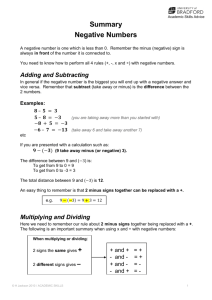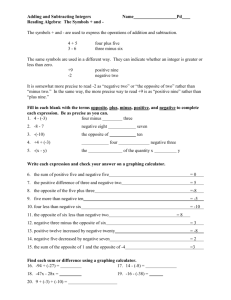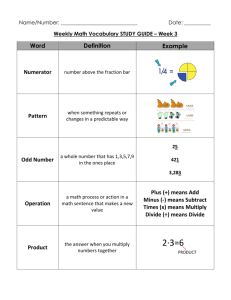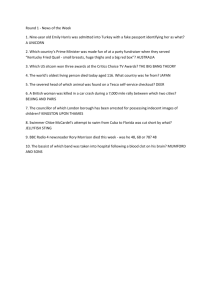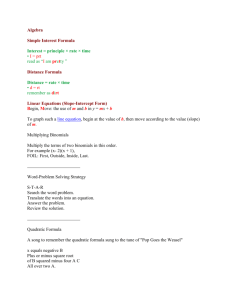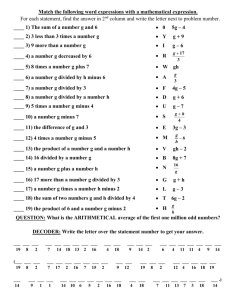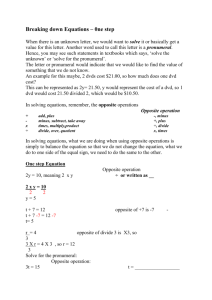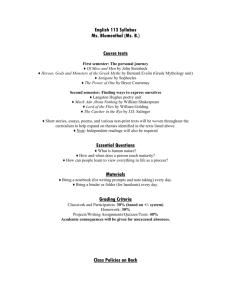Adding and Subtracting Positive and Negative Numbers
advertisement
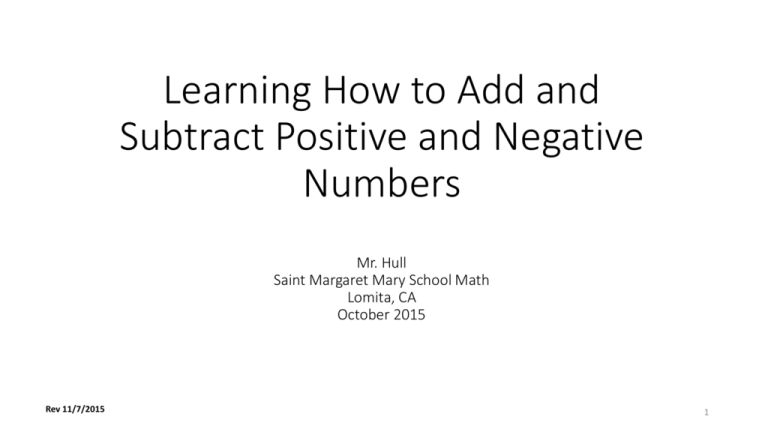
Learning How to Add and Subtract Positive and Negative Numbers Mr. Hull Saint Margaret Mary School Math Lomita, CA October 2015 Rev 11/7/2015 1 Think of these problems as something similar to the memorization of multiplication tables…this will take some work but is well worth the effort! It is an essential skill for Algebra (and life) as negative numbers are just as likely to be part of a problem as positive numbers! One way to do these is to use a number line… 2 Let’s do a simple one: 4 minus 5 (written as “ 4 – 5 “) 1) START by identifying the number 4 on the number line 2) In that we are subtracting 5 we go from that point to the left 5 spaces 3) We end up at negative 1 (or -1) (the answer) finish start 3 Let’s do another one: negative 1 minus 3 (written as “ - 1 – 3 “) 1) START by identifying the number -1 on the number line 2) In that we are subtracting 3 we go from that point to the left 3 spaces 3) We end up at negative 4 (or -4) finish start 4 Let’s do one final one using the number line approach negative 3 plus 7 (written as “ - 3 + 7 “) 1) START by identifying the number -3 on the number line 2) In that we are adding 7 then we go from that point to the right 7 spaces 3) We end up at positive 4 (or just 4…we don’t need a “+” in front of the 4) start finish 5 So you can see that we can use a number line to “model” these types of problems… But…There’s a faster way to do these… The way I think works best is to recognize that there are only a few types of these (about 6 that are different from what you learned before 6th grade…plus “variants”) and once you recognize what type of problem it is then you perform a specific set of steps (“tricks”) to solve the problem… Another way to think of this is to picture types of food and what you do to each type before you eat it! 6 7 8 9 So the real “trick” is to identify the type of problem we have…and then “do the math” The following pages identify the types and variants of problems that we need to identify and solve 10 Problems you most likely learned in 1st or 2nd grade… 3 + 3 = 6 and 6 – 3 = 3 and 5 – 5 = 0 (Note that 5 + -1= 4 is the same as 5 – 1= 4, right? And… -5 + 6 is the same as 6 – 5 = 1, right!?) See…these are easy for you to identify and do! Let’s look at the types of problems we learn in 6th grade and beyond… 11 Problems that look like this: 6 - 9 = 12 - 15 = 12 + -15 = (Did you notice that the 2nd and 3rd problem are the same?) First ask yourself “is this going to be a negative number?” (Answer is “yes” to all of these! Do you know why? Think “where will I end up if I used the number line approach?”) “The Trick” • Remove the negative signs • Subtract the smaller number from the bigger number 9-6=3 15 – 12 = 3 • Then make that answer a negative number…thus 6 – 9 = -3 12 – 15 = -3 12 These are similar, but with the numbers reversed: -9+6= -15 + 12 = (These types of problems will have negative numbers for answers too…right?!) “The Trick” (essentially the same as the ones on the previous page) • Remove the negative signs • Subtract the smaller number from the bigger number 9-6=3 15 – 12 = 3 • Then make that answer a negative number -9 + 6 = -3 -15 + 12 = -3 13 Problems that look like this: 9 – (-6) = 25 – (-3) = 25 - -3 = (Did you notice that the 2nd and 3rd problem are the same?) “The Trick” • This one is fun! • Whenever you have a “minus of a negative number” then… • Change the minuses to plusses! (but don’t change the first number to a minus!) • So 9 – (-6) = 9 + (+6) = 15…Super easy, no? 14 Problems that look like this: - 9 – (-6) = - 25 – (-3)= -25 - -3 = (Did you notice that the 2nd and 3rd problem are the same?) “The Trick” (a little trickier!) • Do the “minus minus” to “plus plus” trick first • So… - 9 – (-6) = -9 + 6 (don’t change the minus to a positive on the first number!) • Now it looks like the problems on page 13, no? • So yes, this one requires a two-step approach (but when you practice enough, you can still do these “in your head”) 15 Problems that look like this: - 9 - 8 = -25 – 5 = -25 + - 5 = (Did you notice that the 2nd and 3rd problem are the same?) “The Trick” • This type is easy, too, once you recognize it (a negative number minus a positive number…or…a negative number plus a negative number) • When you have a negative minus a number, first remove the negative signs, add the two numbers, and put a negative sign in front • Examples: - 9 – 8 = - (9 + 8) = -17 -25 + -5 = -(25 +5) = -30 (You can do these “in your head” when you recognize them, right?!) 16 Problems that look like this: - 9 + 9 = 25 – 25 = 25 + -25 = (Did you notice that the 2nd and 3rd problem are the same?) “The Trick” • Note that any positive number minus itself or any negative number plus its opposite will equal 0. 9 – 9 = 0 -9 + 9 = 0 • Examples: Also: -9 – (-9) = 0 (because the minus minus becomes a plus plus…right?!) 17 That’s it! Now practice makes perfect…use the Excel quiz at : http://smmsspartans.org/bhullnewsnotes.html (the “add and subtract” file) • Start with small numbers in the blue box • The goal is to get to 20 (with 100% correct in under 12 minutes) to be conferred the title “graduate” • When you miss a problem, try to find the similar problem in this presentation to see why you missed it You can do it! 18 1. 2. 3. 4. 5. 6. 7. 8. Learning Process Study the 6 pages with yellow boxes Print out and take the quiz Grade the quiz with the answer key (just put an ‘x’ by a missed problem…don’t write down the correct answer yet) Write down only the page number, if the problem is one of the 6 with yellow boxes (it may not be one of the 6, by the way) Study that page and then write down what you think are the correct answers to the missed problems Check your corrections against the answer key. Study the pages of the problem types you missed Repeat steps 2 – 7 until you are proficient (use a new quiz each time !) (see next page for another idea!) 19 Another Possible Suggestion 1. 2. 3. 4. 5. 6. 7. Print out a quiz Look at page 12 and circle all the problems that look like this Do these problems Look at page 13 and circle and do just these problems Repeat this process through page 17 Note that roughly 8 to 10 problems will be 1st/2nd grade type of problems (3 + 5, 12 – 9, etc.)…these should be what’s left over after step 5. Do these. Now grade and see if this doesn’t help the “sight recognition” aspect of doing these problems. 20
